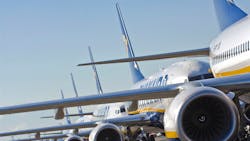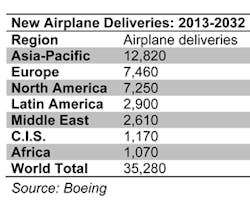Boeing issued its annual 20-year market forecast for commercial aircraft demand, predicting a global market for over 35,000 new planes. The jet builder pegged the value of that demand at $4.8 trillion.
For decades Boeing has produced a long-term global market outlook, and has made it available to the public for nearly 50 years. It describes the annual Current Market Outlook report as “the longest running complete worldwide jet forecast.”
The current forecast anticipates the global volume of aircraft in service to double in the next 20 years. Boeing added that passenger traffic and cargo traffic each would increase at a 5% annual rate over the two decades.
"This forecast gives us confidence as we increase our production rates and invest in new products like the 777X and 787-10X," stated Boeing Commercial Airplanes vice president of Marketing Randy Tinseth. "Airlines are demanding more efficiency and that is exactly what we'll be giving them."
Wide-body jets, such as the 747-8, 777 and 787 Dreamliner, make up another large part of the forecast. Boeing foresees demand for 8,590 such aircraft, mainly as replacement capacity for airlines that need newer and/or more fuel-efficient jets.
"Our customers are focused on growing their networks, managing their capacity and investing in new fleets," said Tinseth. "These trends will shape market demand for airplanes that have highly efficiency, low operating costs, environmentally progressive technologies and a great passenger experience. We believe Boeing's current and future products are perfectly aligned to meet those needs."
About the Author
Robert Brooks
Content Director
Robert Brooks has been a business-to-business reporter, writer, editor, and columnist for more than 20 years, specializing in the primary metal and basic manufacturing industries.


